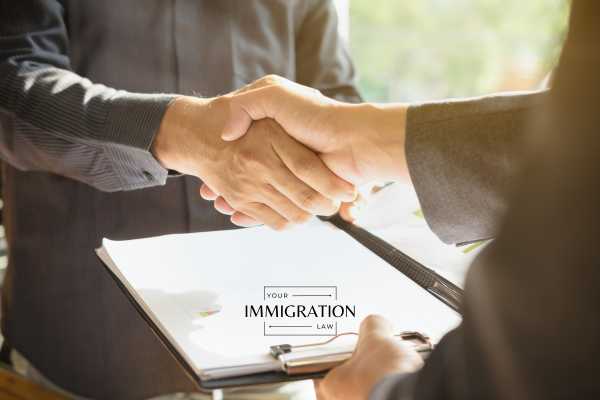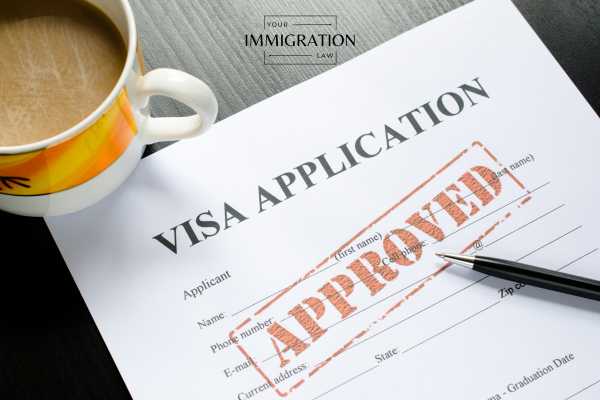The U.S. immigration system can be complex. This is especially true for foreign nationals seeking to use the E-1 visa for international trade. This nonimmigrant visa allows individuals from treaty countries to come to the United States to conduct substantial trade.
Those wanting to start a business in the U.S. must understand the E-1 visa. This includes its requirements, the application process, and how to maintain status. If you need help obtaining an E-1 visa call Your Immigration Law at 313-631-8080 to ensure you meet the requirements for one and get help with the application process.
This guide will explore the E1 visa. It will cover its eligibility requirements, the types of trade it covers, and how an immigration lawyer can help you get and keep this valuable visa.
Overview of the E-1 Visa
The E-1 visa is a non-immigrant visa for treaty country nationals. It is for those who want to engage in international trade with the U.S.
This special visa allows qualified treaty traders to enter the U.S. to conduct business that promotes economic ties with their home country. The E-1 visa especially benefits business owners and employees in trading goods and services. It fosters strong economic ties between nations.

By allowing for substantial trade, the E1 visa not only helps individual traders but also contributes to the broader U.S. economy. It's vital to know the E-1 visa's eligibility and application process. This is for anyone wanting to use this path effectively.
Eligibility Requirements for E-1 Visa Applicants
To qualify for an E-1 treaty trader visa, applicants must meet several key eligibility requirements:
- Nationality: The applicant must be a citizen of a treaty country that has a commerce treaty with the United States. This treaty must allow for the E-1 visa category and facilitate the flow of trade between the two foreign countries.
- Trade Activities: The applicant must show they have substantial trade with the U.S. This trade must involve a continuous flow of activities, indicating a significant, ongoing exchange of items or services.
- Ownership and Control: If the applicant represents a company, they must be a supervisor or an executive. Alternatively, they must possess key skills vital to the business. This ensures that the applicant plays a vital role in facilitating trade activities.
- Intent to Depart: The applicant must show their intent to leave the U.S. when their E-1 nonimmigrant status ends, indicating that they do not intend to remain in the U.S. permanently. This can be demonstrated through ties to their home country, such as family connections or property ownership.
The E-1 Visa Application Process
The E-1 visa application process is designed for individuals engaging in substantial trade between the U.S. and their home country. Understanding the key steps and requirements can help streamline your application and increase your chances of approval.
Initial Consultation and Case Assessment
The first step in the E-1 visa application process is to have an initial consultation with an investment immigration attorney. In this meeting, the lawyer will assess the applicant's case. They will discuss the applicant's trade activities and their alignment with the E-1 visa requirements.
This assessment is vital. It identifies potential challenges. It ensures applicants are ready for the next steps.
Document Preparation and Submission
Once the case is assessed, the next step is to gather and prepare the necessary documentation for the E-1 visa application. Key documents typically include:
- Completion of a form DS-156e
- Proof of nationality (such as a passport).
- Evidence of substantial trade (contracts, invoices, and financial statements).
- A detailed description of the international trade activities and their significance in the context of international exchange.
- Letters from business partners or clients supporting the applicant's trade activities.
E-1 visa lawyers are key in organizing these documents. They ensure all application forms are accurate to avoid delays in processing.
Handling Requests for Additional Evidence (RFEs)
U.S. immigration authorities may issue Requests for Evidence (RFEs) during the application process. They do this if they need more information to decide.
An experienced immigration attorney can help with these requests. They can gather the needed information and address any concerns of the authorities. This may require extra documents. They should show the high trade volume between the applicant's home country and the U.S.
How Long Does the E-1 Visa Application Process Typically Take?
The E-1 visa application process can vary in duration, but it typically takes a few weeks to several months. The timeline depends on the processing times of the U.S. consulate or embassy where the application is submitted. It also depends on any requests for additional evidence.
Applicants should start early to allow for delays. This will ensure their business activities are not interrupted.
How Long Does an E-1 Visa Last?
The E-1 visa, designed for individuals engaging in substantial trade between the U.S. and their home country, is granted for an initial period of up to two years. This visa is specifically for businesses in treaty trader countries and their employees, allowing them to live and work in the U.S. to conduct or manage trade activities.

One of the notable features of the E-1 visa is that it can be renewed indefinitely, as long as the trade relationship between the U.S. and the applicant's home country remains active and the visa requirements continue to be met. Each extension of status typically lasts for up to two years, and there is no maximum limit on the number of renewals.
However, the renewal process requires the applicant to demonstrate that the trade activities are ongoing and substantial, and that they continue to meet all eligibility criteria. It’s essential to maintain the validity of the visa by ensuring compliance with all regulations and providing updated evidence of trade activities and the company's operations.
What Types of Trade Are Covered by the E-1 Visa?
The E-1 visa covers various types of trade, focusing on substantial and ongoing commercial activities between the U.S. and your home country. Understanding these trade types is essential for ensuring your activities meet visa requirements.
Goods, Services, and Technology
The E-1 visa covers various types of trade, including the import and export of goods, services, and technology. Qualifying trade activities can include:
- Manufacturing: Businesses that manufacture products for sale in the U.S. market can benefit from E-1 status.
- Consulting Services: Firms providing consulting services to U.S. businesses are eligible for the E-1 visa.
- Technology Transfers: Companies that transfer technology or expertise between their home country and the U.S. also fall under this visa category.
These activities help strengthen economic ties between the U.S. and the treaty country. They do this by fostering international trade which benefits both economies.
Requirements for Substantial Trade
To qualify for the E-1 visa, applicants must demonstrate what constitutes "substantial trade." This includes:
- Volume of Trade: The trade must be significant in terms of dollar value and frequency. While there is no specific minimum, the volume should reflect a continuous flow of trade that is not marginal.
- Continuity of Business Transactions: The trade activities must be ongoing, indicating a consistent exchange of goods or services over time. This can include regular shipments, ongoing contracts, or repeated services rendered to U.S. clients.
Legal Strategies for Demonstrating Substantial Trade: Working with immigration lawyers can help investors compile the necessary evidence to demonstrate substantial trade.
This may include gathering contracts, invoices, and sales records. They will show the volume and continuity of trade activities. Providing comprehensive documentation is essential to meet the E-1 visa requirements.
What Does an E-1 Visa Attorney Do?
An E-1 visa attorney guides you through the application process, ensuring all requirements are met and documentation is correctly filed. Their experience can simplify complex procedures and enhance your chances of obtaining a visa.
- Conducting Thorough Case Evaluations: An experienced investment visa lawyer will evaluate the case. This will help find its strengths and weaknesses. This evaluation includes reviewing the applicant’s trade activities, business operations, and eligibility for the E-1 visa.
- Gathering and Organizing Supporting Documents: Lawyers assist in gathering and organizing all supporting documents required for the E-1 visa application. They ensure that all paperwork is complete, accurate, and meets U.S. immigration standards.
- Preparing and Filing Visa Petitions and Applications: Investment visa attorneys prepare and file the necessary visa petitions and applications with U.S. immigration authorities. Their experience in immigration law boosts the chances of a successful visa approval. It does so by ensuring all requirements are met and that the application is well-presented.
- Common Challenges in E-1 Visa Cases: E-1 visa cases often present challenges, such as proving the substantial nature of trade and meeting specific eligibility criteria. Understanding these common issues can help you prepare effectively and address potential obstacles in your application.
- Proving Substantial Trade Between Treaty Countries: A major challenge is proving substantial trade with the U.S. Applicants must provide strong evidence of ongoing trade. This can be complex, depending on the business. Demonstrating that the trade is continuous and beneficial for both countries is critical.
- Demonstrating the Applicant's Essential Skills: Applicants must also demonstrate their essential skills or role in the business. This can be challenging if the applicant does not have clear documentation of their contributions or responsibilities. Providing letters from business partners or clients can help support the case.
Addressing Potential Grounds for Inadmissibility: There are various grounds for inadmissibility that can affect E-1 visa applications. Applicants must be aware of potential issues. They should work with their attorneys to address any concerns that may arise during the application process. This proactive approach can help mitigate risks that could lead to application denial.
How to Maintain E-1 Visa Status
Maintaining E-1 visa status requires adhering to specific regulations and ensuring continuous eligibility. Understanding the ongoing requirements is essential for staying compliant and avoiding issues with your visa status.
Compliance with Visa Conditions
E-1 visa holders must continue to engage in substantial trade between the U.S. and their home country. It is vital to keep detailed trade records. Also, ensure the business meets the visa's requirements. Regularly reviewing these activities can help maintain compliance.

Is It Possible to Change Employers While on an E-1 Visa?
Changing employers while on an E-1 visa can be challenging. The new employer must also qualify for E-1 status, and the applicant must submit a new application. An immigration lawyer can clarify the process and requirements for changing employers.
Streamline the E-1 Visa Process Get Legal Support
Securing an E-1 visa involves navigating a complex set of requirements and ensuring that all documentation is accurately prepared. With the right legal guidance, you can simplify the process, avoid common pitfalls, and focus on achieving your business goals in the U.S. An experienced attorney can help you present a strong application and address any issues that may arise.
Don’t risk delays or complications with your E-1 visa application. Contact our immigration law firm today to receive personalized support and advice tailored to your specific situation. Call us at 313-631-8080 to take the next step toward successfully expanding your business in the U.S. with confidence and peace of mind.